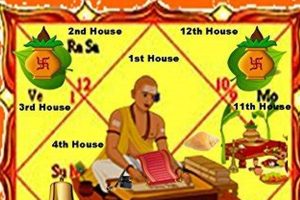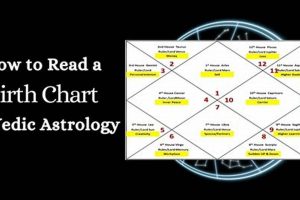Jyotia, commonly known as Indian or Hindu astrology, offers a distinct approach compared to its Western counterpart. While both systems seek to understand celestial influences on human lives, they differ fundamentally in their calculations and interpretations. One key difference lies in the zodiac used: Jyotia employs a sidereal zodiac based on the fixed constellations, while Western astrology uses a tropical zodiac measured from the vernal equinox. This results in a roughly 24-degree difference in planetary placements. Furthermore, Jyotia emphasizes lunar mansions (Nakshatras) and incorporates concepts like dashas (planetary periods) for detailed timing of events. Western astrology, in contrast, often focuses on the interplay of planets within the houses and signs, utilizing aspects and transits for predictive purposes.
The divergent methodologies offer unique perspectives on self-understanding and forecasting. Historically rooted in ancient Vedic traditions, Jyotia connects planetary influences with karma and reincarnation, providing a framework for spiritual development and life path analysis. Western astrology, evolving from Hellenistic and Babylonian traditions, frequently emphasizes psychological insights and personality traits, aiding in self-discovery and navigating current life circumstances. Both traditions have played significant roles in shaping cultural understanding of time, fate, and human destiny across centuries.
This exploration will delve deeper into the specific differences between these two astrological systems, examining their respective strengths and limitations, and offering readers a comprehensive understanding of the diverse approaches to celestial interpretation. Subsequent sections will address the contrasting zodiacs, the varying approaches to planetary interpretations, and the distinct predictive techniques employed by each system.
Understanding Astrological Systems
Navigating the diverse world of astrology can be challenging. These tips offer guidance for those seeking to differentiate between and utilize insights from both Jyotia (Vedic) and Western astrological systems.
Tip 1: Recognize the Zodiacal Difference: Understand that Jyotia uses a sidereal zodiac based on the fixed constellations, while Western astrology employs a tropical zodiac measured from the vernal equinox. This fundamental difference affects planetary placements and interpretations.
Tip 2: Consider the Focus of Each System: Jyotia emphasizes karmic influences, reincarnation, and life path, while Western astrology often focuses on psychological insights and personality traits.
Tip 3: Explore Nakshatras and Dashas: Delve into the unique Jyotia concepts of Nakshatras (lunar mansions) and Dashas (planetary periods) for nuanced insights into specific life events and timings.
Tip 4: Examine Transits and Progressions: Study how transits and progressions are utilized in Western astrology to understand current influences and potential future developments.
Tip 5: Consult Qualified Practitioners: When seeking astrological guidance, research and choose practitioners with expertise in the specific system you wish to explore.
Tip 6: Integrate Both Perspectives: Consider the potential benefits of integrating insights from both systems for a broader understanding of oneself and one’s life path. Recognize that each system offers unique strengths and perspectives.
Tip 7: Maintain a Critical Mindset: Approach astrological information with a critical and discerning mind. Use astrology as a tool for self-reflection and exploration, rather than as a definitive source of predictions.
By understanding these key differences and applying these tips, individuals can gain a more comprehensive understanding of the various astrological systems and their potential applications. Discernment and critical thinking are crucial when navigating the complex and fascinating world of astrology.
This exploration has provided insights into the key distinctions between Jyotia and Western astrology. The concluding section will summarize the core differences and highlight the potential benefits of understanding both systems.
1. Zodiacal Systems
Zodiacal systems form a cornerstone of astrological practice, representing a fundamental difference between Vedic and Western traditions. This divergence stems from the distinct ways each system measures the zodiac. Vedic astrology utilizes a sidereal zodiac, aligning with the observable constellations. Western astrology employs a tropical zodiac, based on the Sun’s apparent relationship to the Earth’s equator and the vernal equinox. This distinction results in approximately a 24-degree difference in planetary placements. Consequently, an individual might be considered a Virgo in Western astrology but a Leo in Vedic astrology. This difference impacts interpretations of planetary influences and personality traits. Understanding the specific zodiacal system employed is crucial for accurate astrological analysis. For example, an individual seeking to understand their career prospects through Vedic astrology would receive different insights than if a Western astrological chart were used, due to the contrasting planetary positions.
The practical significance of this zodiacal difference extends beyond individual chart interpretations. It influences the timing of astrological events and transits. For example, the timing of a particular planetary transit, such as Jupiter entering a specific sign, will differ depending on the zodiacal system used. This affects predictions related to auspicious periods, challenges, and opportunities. The choice of zodiacal system, therefore, shapes the entire astrological framework. Understanding this fundamental distinction provides clarity and context for interpreting astrological information, enabling individuals to utilize astrological insights effectively. The seemingly technical difference carries profound implications for how individuals understand their place within the cosmos.
In summary, comprehending the contrasting zodiacal systems is paramount for navigating the complexities of Vedic and Western astrology. The choice of zodiac directly impacts planetary placements, influencing personality analysis, predictive techniques, and the timing of astrological events. Recognizing this crucial distinction provides clarity and context, enabling individuals to utilize astrological insights more effectively and appreciate the nuanced perspectives offered by each tradition. This foundational knowledge empowers individuals to engage with astrological information critically and meaningfully.
2. Planetary Interpretations
Planetary interpretations represent a critical point of divergence between Vedic and Western astrology. While both systems acknowledge the significance of celestial bodies, their interpretive frameworks differ substantially. These differences arise from distinct cultural and philosophical underpinnings. Vedic astrology, rooted in ancient Vedic texts and Hindu cosmology, connects planetary influences with karma, reincarnation, and dharma (life purpose). Western astrology, influenced by Hellenistic and medieval traditions, often emphasizes psychological archetypes, personality traits, and individual potential. These contrasting perspectives shape how each system interprets the influence of specific planets.
For example, Mars, often associated with aggression and drive in Western astrology, represents energy, action, and courage in Vedic astrology. While negative manifestations may include anger or impulsivity, the core interpretation centers on dynamic energy. Similarly, Saturn, often viewed as a restrictive and challenging influence in Western astrology, signifies discipline, structure, and karma in Vedic astrology. Its influence is considered a teacher, prompting lessons and growth through challenges and responsibilities. These nuanced interpretations highlight the complexities of planetary influences and the importance of understanding the specific astrological system employed. Applying Western interpretations to a Vedic chart, or vice versa, could lead to misinterpretations and inaccurate assessments.
In practical application, these interpretive differences profoundly impact astrological consultations. A Vedic astrologer might emphasize karmic patterns and life path analysis, recommending remedies to mitigate challenging planetary influences or enhance positive ones. A Western astrologer might focus on psychological counseling and self-development, helping individuals understand and navigate their inner landscape in relation to planetary transits and aspects. Both systems offer unique perspectives and valuable insights, but accurate interpretation relies on a clear understanding of the underlying philosophical frameworks. Recognizing these distinctions empowers individuals to seek astrological guidance appropriate to their needs and perspectives. Ultimately, comprehending the nuanced planetary interpretations within each system is crucial for accurate and meaningful astrological analysis.
3. Predictive Techniques
Predictive techniques constitute a core element of both Vedic and Western astrology, offering insights into potential future trends and life events. However, the methodologies employed by each system differ significantly, reflecting their distinct philosophical and computational approaches. Understanding these differences is crucial for accurate interpretation and application of astrological predictions.
- Planetary Transits
Planetary transits, a cornerstone of predictive astrology, involve analyzing the movement of planets through the zodiac and their influence on an individual’s birth chart. In Western astrology, transits are often analyzed in relation to planetary aspects, such as conjunctions, squares, and oppositions, to assess potential challenges and opportunities. Vedic astrology emphasizes transits through specific signs and houses, and their interaction with the individual’s dasha (planetary period) system, to determine the timing and nature of events. For example, the transit of Saturn over the Moon might be interpreted differently in each system, depending on other factors considered.
- Dashas (Planetary Periods)
Dashas, unique to Vedic astrology, represent specific time periods ruled by different planets. Each dasha is believed to bring forth particular karmic lessons and opportunities related to the ruling planet. For instance, a Jupiter dasha is generally associated with growth, prosperity, and good fortune, while a Saturn dasha often signifies challenges, hard work, and karmic lessons. The dasha system provides a framework for understanding the timing and nature of life events, adding a crucial dimension to Vedic astrological predictions.
- Progressions and Solar Returns
Western astrology utilizes techniques like progressions and solar returns to forecast future trends. Progressions involve symbolically advancing the birth chart to understand developmental cycles, while solar returns analyze the chart cast for the exact moment of the Sun’s return to its natal position each year. These techniques offer insights into potential themes and events during specific periods, providing a dynamic perspective on the individual’s evolving life path.
- Annual Charts (Varshaphal)
Vedic astrology employs annual charts, known as Varshaphal, to forecast the year ahead. These charts are calculated based on the individual’s birth chart and the position of the Sun at the beginning of the solar year. Varshaphal charts provide insights into specific areas of life, such as career, relationships, and health, offering guidance and predictions for the year.
These diverse predictive techniques highlight the distinct approaches of Vedic and Western astrology. While both systems aim to provide insights into the future, their methodologies reflect their unique philosophical frameworks and computational approaches. Understanding these differences is essential for accurately interpreting astrological predictions and utilizing them effectively for self-awareness and guidance. Integrating insights from both traditions can offer a more comprehensive perspective, providing a richer understanding of potential future trends and their implications for personal growth and development.
4. Karmic Emphasis
A core distinction between Vedic and Western astrology lies in their approach to karma. Vedic astrology, deeply rooted in Hindu philosophy, places significant emphasis on karmic influences as a driving force shaping human destiny. This perspective views present circumstances as consequences of past actions, highlighting the interconnectedness of past, present, and future. Western astrology, while acknowledging the concept of cause and effect, generally focuses less on karmic implications, emphasizing instead psychological development and free will. This difference significantly impacts interpretations and predictions within each system. Vedic astrology uses the birth chart as a map of past karma, offering insights into potential challenges and opportunities for growth based on previous actions. Remedial measures, such as gemstone recommendations or specific rituals, are often suggested to mitigate negative karmic influences.
The importance of karmic emphasis within Vedic astrology extends beyond individual chart interpretations. It informs the understanding of relationships, career paths, and life purpose. For example, challenging relationships might be viewed as karmic lessons, providing opportunities for growth and understanding. Career choices are seen as reflections of past karmic tendencies, with potential for growth and fulfillment aligning with one’s dharma (life purpose). This perspective encourages individuals to take responsibility for their actions and understand life events within a broader karmic context. While not explicitly emphasized in Western astrology, understanding karmic principles can provide valuable insights into recurring patterns and challenges, encouraging self-awareness and personal growth. Integrating karmic considerations can enhance interpretations within Western astrology, adding depth and context to psychological analysis.
In summary, the emphasis on karma distinguishes Vedic astrology significantly from Western astrology. Understanding the role of karma within Vedic astrology offers a unique perspective on life’s challenges and opportunities, encouraging self-reflection and personal responsibility. While Western astrology traditionally focuses less on karmic implications, incorporating these principles can enrich interpretations and promote a deeper understanding of individual life paths. Recognizing this fundamental difference clarifies the distinct approaches of each system and empowers individuals to utilize astrological insights effectively for self-awareness and personal growth.
5. Cultural Context
Cultural context significantly shapes the interpretation and practice of Vedic and Western astrology. Vedic astrology, originating in ancient India, is deeply intertwined with Hindu cosmology, philosophy, and rituals. Its emphasis on karma, reincarnation, and dharma (life purpose) reflects these cultural values. Interpretations often incorporate Vedic deities, mythology, and traditional remedies, such as gemstone recommendations or mantra recitation. For example, the planet Jupiter, known as Guru (teacher) in Vedic astrology, is associated with wisdom, spirituality, and good fortune, reflecting its revered status within Hindu culture. Western astrology, evolving through Greek, Roman, and medieval European influences, emphasizes individual psychology, personality traits, and self-discovery. Its interpretations often draw upon Greco-Roman mythology and philosophical concepts, reflecting its Western cultural heritage. For instance, the planet Venus, associated with love and beauty, connects with the Roman goddess of the same name, embodying aesthetic values within Western culture. Understanding these cultural nuances provides crucial context for accurate interpretation.
The influence of cultural context extends beyond symbolic interpretations. It shapes the practical application of astrology within different societies. Vedic astrology plays a significant role in various aspects of Indian life, including marriage compatibility assessments, career choices, and auspicious timing for important events. This integration reflects its deep cultural embeddedness. Western astrology, while less integrated into mainstream Western culture, has influenced literature, art, and psychological thought. Its increasing popularity in personal development and self-discovery reflects evolving cultural values. Furthermore, specific astrological techniques, like electional astrology (choosing auspicious times) are practiced differently based on cultural norms and beliefs. For example, choosing a wedding date in Vedic astrology involves careful consideration of lunar mansions and planetary positions, aligning with traditional Hindu practices. In Western astrology, electional astrology may consider planetary aspects and transits, influenced by Western cultural preferences.
In summary, cultural context plays a vital role in shaping the interpretation, practice, and societal integration of both Vedic and Western astrological systems. Recognizing these cultural influences provides crucial context for understanding the nuanced interpretations and diverse applications of astrology across different cultures. This awareness allows for a deeper appreciation of the rich tapestry of astrological traditions and their ongoing evolution within diverse cultural landscapes. Disregarding cultural context risks misinterpretations and limits the potential for meaningful insights. Ultimately, understanding the interplay between astrology and culture enriches the study and practice of astrology, fostering cross-cultural understanding and promoting a more nuanced appreciation of its diverse forms.
Frequently Asked Questions
This FAQ section addresses common inquiries regarding the differences between Vedic and Western astrology, aiming to clarify distinctions and provide concise, informative responses.
Question 1: What is the primary difference between Vedic and Western astrology?
The most significant difference lies in the zodiac employed. Vedic astrology uses a sidereal zodiac based on the fixed constellations, while Western astrology uses a tropical zodiac measured from the vernal equinox. This results in approximately a 24-degree difference in planetary placements.
Question 2: How do planetary interpretations differ between the two systems?
While both systems analyze planetary influences, interpretations diverge due to distinct cultural and philosophical frameworks. Vedic astrology connects planets with karma, reincarnation, and dharma, while Western astrology emphasizes psychological archetypes and personality traits. This leads to nuanced differences in understanding each planet’s influence.
Question 3: Which system is more accurate?
Accuracy depends on individual perspectives and the specific questions addressed. Both systems offer valuable insights when applied correctly. Vedic astrology excels in karmic and life path analysis, while Western astrology offers valuable psychological perspectives. The “better” system depends on individual needs and preferences.
Question 4: Can one integrate insights from both systems?
Integrating insights from both systems can provide a broader understanding. Each system offers unique strengths, and combining their perspectives can offer a more comprehensive view of one’s life path and potential. However, careful consideration of the underlying principles of each system is crucial for accurate integration.
Question 5: How does the concept of karma influence Vedic astrology?
Karma is a central tenet in Vedic astrology. The birth chart is viewed as a map of past karma, influencing present circumstances and future potentials. Vedic astrology offers remedies and practices to mitigate negative karmic influences and enhance positive ones.
Question 6: Are predictive techniques the same in both systems?
Predictive techniques differ significantly. Vedic astrology uses dashas (planetary periods) and annual charts (Varshaphal), while Western astrology emphasizes transits, progressions, and solar returns. These distinct methodologies reflect the unique computational and philosophical approaches of each system.
Understanding these key distinctions provides a foundation for further exploration of Vedic and Western astrology. Continued research and consultation with experienced practitioners can deepen one’s comprehension of these complex systems.
The following section will offer concluding thoughts on the comparative analysis of Vedic and Western astrology.
Vedic vs. Western Astrology
Exploration of Vedic versus Western astrology reveals fundamental differences impacting interpretations and applications. The contrasting zodiacs, sidereal versus tropical, influence planetary placements, affecting astrological readings. Divergent cultural and philosophical roots shape interpretations: Vedic astrology emphasizes karma and dharma, while Western astrology leans towards psychological analysis. Predictive techniques, such as dashas in Vedic astrology and transits in Western astrology, further distinguish the systems. Recognizing these core distinctions provides a framework for understanding the unique strengths of each tradition. Neither system inherently surpasses the other; their value lies in their distinct approaches to understanding celestial influences.
Astrology, regardless of tradition, serves as a tool for self-discovery and navigating life’s complexities. Whether seeking karmic insights or psychological understanding, the chosen system should align with individual needs and resonate with personal beliefs. Continued exploration of both Vedic and Western astrology fosters a deeper appreciation for the diverse perspectives within this ancient practice. Discernment and critical thinking remain crucial for navigating the intricate world of astrological interpretations, empowering individuals to utilize these tools effectively for self-awareness and personal growth.







